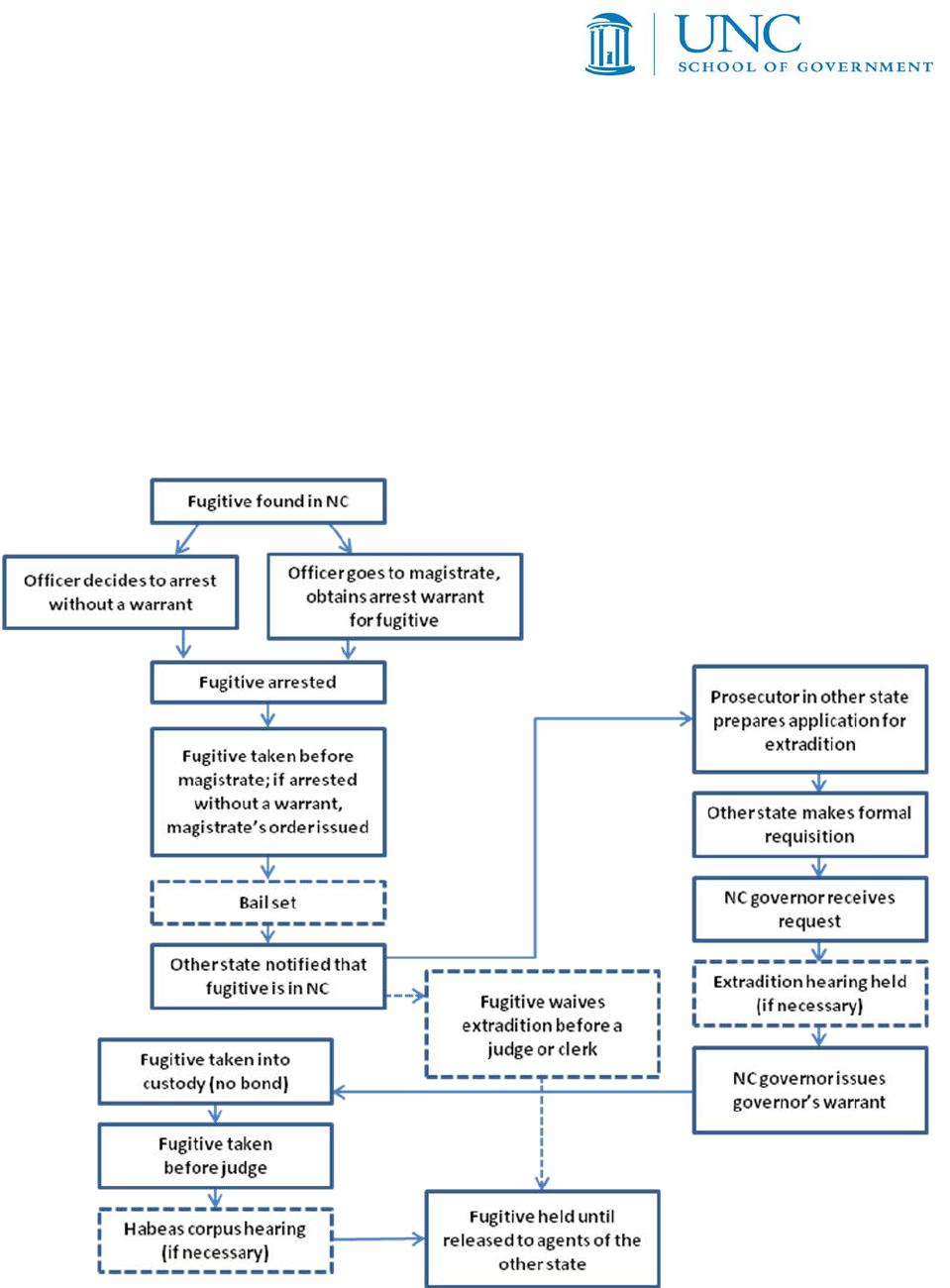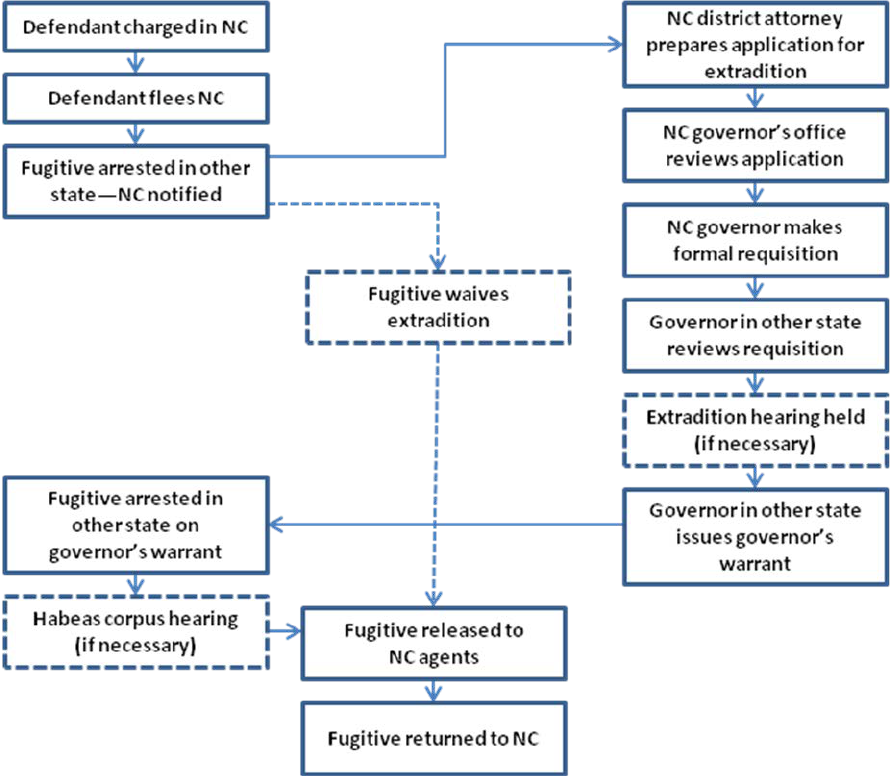
1
EXTRADITION AND THE INTERSTATE COMPACT FOR
A
DULT OFFENDER SUPERVISION
Advanced Criminal Procedure for Magistrates
Jamie Markham, Assistant Professor
919.843.3914, markham@sog.unc.edu
EXTRADITION
Extradition is the procedure to return a fugitive to the state where he or she committed a crime, escaped
from incarceration, or violated probation and parole.
Scenario 1: A fugitive from another state is found in North Carolina
When a fugitive from another state is found in North Carolina there are several stages in the extradition
process at which a magistrate may be involved.
2
When an officer comes to a magistrate before arresting a fugitive, the magistrate should:
Determine whether there are proper grounds for arresting the fugitive. There are three
grounds that justify issuance of a fugitive arrest warrant:
1. A person was charged with a crime in another state and fled to North Carolina;
2. A person was convicted in another state and escaped to North Carolina;
3. A person violated conditions of probation or parole by coming to North Carolina.
The officer’s information must be reliable. It will typically consist of a DCI-PIN message, but
it could also be in the form of some other communication from the other state. The
magistrate DOES NOT determine whether there is probable cause to believe the person
committed the crime in the other state. The magistrate only determines that one of the three
grounds for arrest listed above exists and that this is the person wanted by the other state.
Complete the Fugitive Affidavit (AOC-CR-911M) and the Warrant for Arrest for Fugitive
(AOC-CR-910M). Attach copies of the document or information used to establish the person’s
fugitive status and remind the officer to bring a copy of the out-of-state charging document
to the clerk as soon as possible.
When the fugitive is brought before the magistrate, follow the appearance procedure below.
When an officer comes to a magistrate after arresting the fugitive without a warrant, the
magistrate should:
Determine whether the person has been charged with a crime in another state that is
punishable there by death or imprisonment for more than one year. (An officer may arrest a
fugitive without a warrant only when that is the case.) The magistrate DOES NOT determine
whether there was probable cause for the charge in the other state—only whether the
person has been charged there, and that the person arrested is the person charged.
Complete a Fugitive Affidavit (AOC-CR-911M) and the Magistrate’s Order for Fugitive (AOC-
CR-909M). Attach copies of the document or information used to establish the person’s
fugitive status and remind the officer to bring a copy of the out-of-state charging document
to the clerk as soon as possible so they may be attached to the original copy of the
magistrate’s order in the clerk’s office.
Follow the appearance procedure below.
Appearance procedure when the fugitive is brought before a magistrate:
Inform the fugitive of charges and his or her right to communicate with counsel and friends.
If applicable, set release conditions. Under G.S. 15A-736, bail is improper when the out-of-
state offense is punishable in that state by death or life imprisonment. That same statute
says bail is only proper “by bond, with sufficient sureties.” Many local bond policies offer
guidance on setting bonds for fugitives.
Order the earliest possible appearance before a district court judge (or a time within 30 days
if the chief district court judge has a policy to that effect).
If bail is not allowed or the fugitive cannot make bond, commit the fugitive to the county jail.
3
Note: A magistrate CANNOT accept a waiver of extradition. G.S. 15A-746; 42 N.C.A.G. 267 (1973).
Governor’s warrant
If the fugitive does not waive extradition, the state from which the fugitive fled must formally
ask (through a “requisition”) the governor of North Carolina to extradite. The governor of North
Carolina will, in turn, issue a governor’s warrant. The governor’s warrant gives North Carolina
officials the authority to take the fugitive into custody to await pick-up by officials from the other
state. (In fact, the person may already be in custody if he or she was not allowed bail or was
unable to make bail following his or her initial arrest in North Carolina.)
When a defendant is brought before the magistrate on a governor’s warrant:
Tell the fugitive that the governor of North Carolina has issued a warrant for him or her to be
taken into custody and returned to the state from which he or she fled.
Inform the fugitive of his or her right to communicate with counsel and friends.
Commit the fugitive to the jail. Bond is not authorized after arrest on a governor’s
warrant.
Order the earliest possible appearance before a district court judge (where the fugitive will
be informed of the right to apply for a writ of habeas corpus).
When a person commits a crime in another state and is found in North Carolina before being
charged in the other state:
Rarely, a person commits a crime in another state and flees to North Carolina before the other
state has an opportunity to charge the person. Before arresting such a person, officers should
obtain an arrest warrant from a judicial official in North Carolina. In these cases, the magistrate
must independently determine that there is probable cause to believe the person committed a
crime in the other state. The magistrate should use a standard North Carolina arrest warrant
(not a fugitive arrest warrant), modified to indicate that the crime is one committed against the
law of another state.
Scenario 2: A person commits a crime in North Carolina and flees to another state.
When a person commits a crime in North Carolina and flees to another state and is found there, he or
she has a right to extradition proceedings in the other state (the “asylum state”) before being returned
to North Carolina. Many people waive that right. For fugitives who do not waive the formal extradition
process, the district attorney of the North Carolina county where the fugitive is charged must put
together the documents that the North Carolina governor’s office will need to make a formal
REQUISITION for the return of the person charged. G.S. 15A-743.

4
The magistrate’s role in the requisition process is limited. In fact, only if an arrest warrant is used as the
charging document for the North Carolina crime is the magistrate likely to be involved at all. The
extradition law requires the requisition application to be verified by an affidavit (usually by the
investigating officer or the victim) that states the grounds for charging the defendant. G.S. 15A-743.
Some other states will not grant the extradition request if the date of the affidavit is later than the date
of the arrest warrant. Because oral sworn testimony is sufficient to support an arrest warrant in North
Carolina, it is possible that there may be no affidavit accompanying the original arrest warrant. As a
result, the magistrate is sometimes asked issue a new warrant when the affidavit is prepared so
the date on the warrant matches the affidavit. The magistrate may also be asked to complete
FORM GOV 1-A, certifying the charging documents he or she prepared. If the fugitive has already
been charged by indictment in North Carolina, no affidavit—and therefore no action by the magistrate—
is generally necessary.

5
THE INTERSTATE COMPACT FOR ADULT OFFENDER SUPERVISION
Not all probationers or parolees under supervision for out-of-state convictions who are found in North
Carolina are fugitives. Some have their supervision formally transferred to North Carolina under the
Interstate Compact for Adult Offender Supervision (ICAOS). In exchange for having their supervision
transferred, Interstate Compact offenders agree to abide by the conditions of the “Sending State,” (the
state of conviction), the “Receiving State,” (North Carolina), and the ICAOS Rules. Offenders waive
extradition as a condition of transfer under the Compact.
Though Compact offenders are supervised by North Carolina probation officers, they remain under the
legal jurisdiction of the Sending State. Thus, even when a Compact offender violates probation here, the
warrant for his or her arrest on the violation will actually come from the Sending State. Out-of-state
warrants for Compact offenders should be processed through North Carolina’s Compact Administrator
in Raleigh; if that happens, the warrant will be accompanied by an “Authority to Detain and Hold” form,
clearly noting that the offender is subject to the Compact. Sometimes, however, a Sending State will fail
to go through North Carolina’s Compact Administrator and will instead send its warrant directly to local
officials here. When that happens, it may be difficult for the magistrate to distinguish between an out-of-
state warrant for a Compact probationer and a true fugitive probationer.
How to identify Compact offenders:
• If properly coordinated, an out-of-state warrant for a Compact offender will be accompanied by an
“Authority to Detain and Hold” form, signed by NC’s Compact Administrator.
• Contact the local Probation office or call the Compact Administrator in Raleigh (919-716-3160).
• Go to http://webapps6.doc.state.nc.us/opi/offendersearch.do?method=view
, and enter the offender’s
name. Compact offenders are identified as such in the “Offender Information” block.
For Interstate Compact offenders use the following procedure:
Inform the offender of the alleged violation.
Inform the offender of his or her right to communicate with counsel and friends.
Commit the fugitive to the jail. Bond is not authorized for Interstate Compact offenders.
Contact a local probation officer or the North Carolina Interstate Compact Administrator (Jay
Lynn) at 919-716-3160 to inform the Administrator that a Compact offender has been taken
into custody. The Administrator will schedule a probable cause hearing before a Department
of Correction hearing officer within 15 days. If the hearing officer finds probable cause that a
violation occurred, the North Carolina Administrator will notify the Sending State, which will
then decide whether to retake the offender under the Compact. G.S. 148-65.8.
